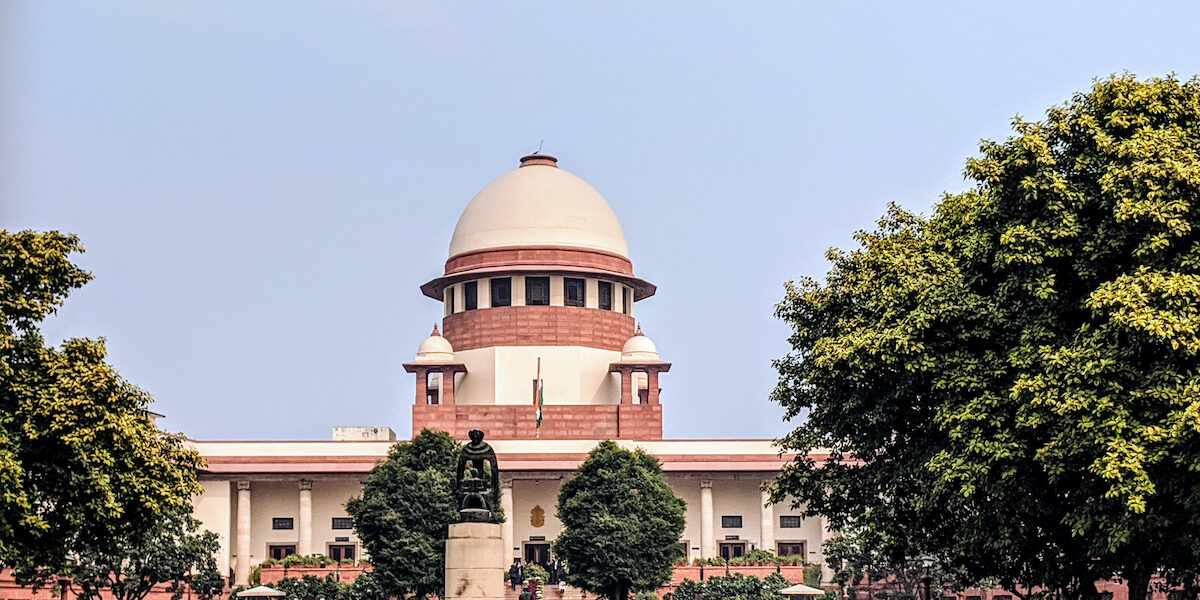The SC will rule on whether or not the existing electoral bonds scheme encourages anonymous corporate funding to political parties.

The Supreme Court of India. (iStock)
On Thursday, 15 February, the Supreme Court will rule on whether or not the existing electoral bonds scheme encourages anonymous corporate funding to political parties and if it was wrongly certified as a Finance Act.
The verdict will have an impact on the nature of transparency in election funding in India.
The five-judge Bench that heard the case is led by Chief Justice DY Chandrachud and comprises Justices Sanjiv Khanna, BR Gavai, JB Pardiwala and Manoj Misra.
Here are the questions before the Supreme Court when the petitions were filed with it:
An electoral bond is like a promissory note. It is a bearer instrument payable to the bearer on demand. Unlike a promissory note, which contains the details of the payer and payee, an electoral bond has no information on the parties in the transaction at all, providing complete anonymity and confidentiality to the parties.
The Finance Ministry introduced the Electoral Bonds Scheme 2018 on 2 January, 2018.
Under the scheme, specific branches of the State Bank of India were authorised to sell electoral bonds. Bonds could be purchased in denominations of ₹1,000, ₹10,000, ₹1,00,000, ₹10,00,000, and ₹ 1,00,00,000 from the SBI. The bonds were to be sold for 10 days in January, April, July, and October each year.
The identity of the purchaser would remain anonymous to everyone, except the SBI, which must record the buyer’s Know Your Customer (KYC) details.
Political parties getting over one percent votes “in the last general election to the House of the People or a Legislative Assembly” are eligible to accept donations through electoral bonds.
The political parties must encash the bond within 15 days of receiving it. After this period ends, the funds are deposited to the Prime Minister’s Relief Fund.
In 2017 and 2018, the Association for Democratic Reforms (ADR), Common Cause (a non-profit organisation), and the CPI(M) challenged the Finance Act that came into force to implement the Scheme on the premise that the amendments introduced for laying the legal framework would not allow transparency in political funding.
The other argument was that the government got the Finance Act passed as a money Bill to avoid scrutiny by the Rajya Sabha.
In March 2019, the Election Commission of India filed an affidavit challenging the Electoral Bond Scheme. The affidavit claimed that exempting political parties from sharing details of contributions would keep information on foreign funding in the dark. In such a case, there was a fear of foreign companies influencing government policy, it said.
In response, the Union government said the Scheme was “a pioneer step in bringing electoral reforms, to ensure that the spirit of transparency and accountability in political funding is maintained”. The government view was that political parties mostly got cash donations and that was leading to “unregulated flow of black money”.
In April 2019, a Supreme Court Bench of then chief justice Ranjan Gogoi asked political parties to submit details of donations, donors, and bank account numbers in a sealed cover to the ECI.
However, the court did not stay the implementation of the Scheme on the ground that that “such weighty issues would require an in-depth hearing”.
Between then and 2021, the petitioners — ADR, Common Cause, and CPI(M) — approached the court for a stay, but that did not happen. In 2021, ADR’s plea before the apex court for a stay on the scheme before a fresh round of bond sales began was again denied.
The Bench headed by then chief justice SA Bobde said that the “apprehension that foreign corporate houses may buy the bonds and attempt to influence the electoral process in the country, is…misconceived”.
On 16 October, 2023, the petitioners approached the Supreme Court for hearing case before the general elections in 2024. The Bench, then headed by Chief Justice DY Chandrachud, observed the issue was important and referred the case to a five-judge Constitution Bench.
The Constitution Bench was constituted on 31 October and it heard arguments over three days.
The Supreme Court Observer summed them up: “Petitioners argued that the electoral bonds scheme increased corporate funding, black money circulation, and corruption. They argued that voters have a right to information about political parties’ source of funding, as it informs the policies and views of that party. The Union contended that the scheme was designed to guarantee confidentiality and the right to privacy of the donors, who were otherwise exposed to retribution from political parties that they didn’t fund.”
The Constitution Bench reserved judgement on 2 November and had asked the Election Commission to furnish all data on donations political parties received through the scheme until 30 September, 2023.